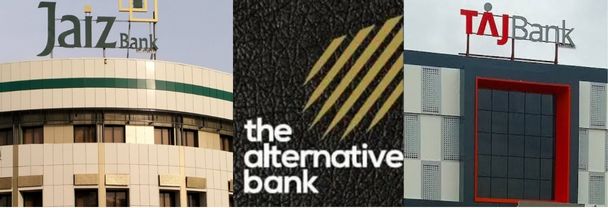Nigeria’s non-interest banks – Jaiz, TAJ and The Alternative Banks – recorded significant growth in assets in the 2024 financial year.
Analysis of the banks’ full-year 2024 financial results revealed that the non-interest financial institutions recorded strong financial performance during the period.
Pinnacle Daily’s analysis of the three banks’ 2024 financial reports revealed a combined total of ₦2.341 trillion in assets in 2024. This is a significant increase of 82.76 per cent from a combined total of ₦1.281 trillion for the three banks in 2023.
Asset growth in banks indicates successful business expansion, allowing for greater lending and operational scale, which ultimately drives higher profitability and long-term financial stability. It’s a key metric for demonstrating growth and potential.
Jaiz Bank’s total assets grew by 86 per cent, reaching ₦1.08 trillion in 2024 from ₦580 billion in 2023. Crossing the one-trillion-naira threshold in 2024 was a historic achievement for the leading non-interest bank in Nigeria.
This feat, according to Jaiz Bank’s managing director, Dr Haruna Musa, reflects not only the resilience of the bank’s business model but also the trust and confidence reposed in it by its shareholders, customers, and stakeholders.
The gross earnings of Jaiz, Nigeria’s premier non-interest bank, grew by 75 per cent, rising from ₦47.24 billion in 2023 to ₦82.87 billion in 2024. While the profit before tax surged by 121 per cent to ₦24.44 billion from ₦11.05 billion in 2023, the profit after tax was ₦23.48 billion (up by 109 per cent from ₦11.24 billion in 2023).
READ ALSO: Nigerian Banks’ 2025 Profit to Drop by 19% – Agusto
The factors that contributed to Jaiz Bank’s asset growth include a significant increase in investment in Sukuk (from ₦152.20 billion in 2023 to ₦167.67 billion in 2024); growth in customer current deposits (93.92 per cent surge from ₦466.57 billion in 2023 to ₦904.78 billion in 2024); improved profitability and operational efficiency metrics, including higher Return on Equity and Return on Assets; and strengthened Capital Adequacy Ratio (CAR) and Liquidity Ratio (LR).
TAJBank also reported significant growth, with total assets nearing 1 trillion (₦953.10 billion), reflecting an 84 per cent increase from ₦518.33 billion in 2023. Its gross earnings rose by 80 per cent to ₦75.5 billion from ₦43.2 billion in 2023.
The bank, which began operations five years ago, recorded 61 per cent growth in its profit before tax from ₦11.3 billion in 2023 to ₦18.2 billion in 2024. TAJBank’s deposit base also showed significant growth, rising by 89 per cent from ₦369.33 billion to ₦696.34 billion.
While Jaiz Bank declared a dividend of 7 kobo per share to its customers, TAJBank offered an impressive 20 kobo per share dividend—its third payment to shareholders in five years.
TAJBank’s CEO, Hamid Joda, said the decision to pay dividends was consistent with the bank’s policy to prioritise shareholder interests despite macroeconomic challenges.
“With the payment of the third dividend to the shareholders within five years of operations, TAJBank’s Board and management have again demonstrated that investors’ interest remains a priority in their drive to sustain the bank at the forefront of the non-interest banking space in Nigeria,” Joda stated.
He said the bank’s performance in the past years, since it began operations, reflects the “management’s proactive strategies and innovativeness in service delivery”.
Jaiz Bank and TAJBank operate under the Islamic banking framework, offering products that comply with Shari’ah principles.
READ ALSO: Pressure Mounts on Nigerian Tier-2 Banks as Mergers Loom
The Alternative Bank’s total assets rose by 68.3 per cent from ₦182.7 billion in 2023 to ₦307.5 billion in 2024. Its gross earnings were ₦35.76 billion, 75 per cent up from the previous year. The bank recorded ₦10.4 billion as PBT (96.7 per cent rise from 2023) and ₦10.1 billion as PAT (111 per cent rise from the previous year).
While customers’ current deposits stood at ₦136.03 billion (an 89.73 per cent increase from 2023), the bank’s investment in Sukuk rose by 68 per cent to ₦65.7 billion.
The non-interest finance model has recorded significant growth over the years in the Nigerian banking sector. Financial institutions offering non-interest financial services in Nigeria are categorised into two: non-interest banking and finance based on Islamic commercial jurisprudence and non-interest banking and finance based on any other established non-interest principle.
International credit rating agency Fitch had earlier in the year projected that Nigeria’s non-interest finance sector would experience sustained growth from the second half of 2025 through 2026. It said this will primarily be driven by strong investor appetite for Sukuk (Islamic bonds) and increasing public awareness.
“Nigeria has notable potential for Islamic finance, supported by having one of the largest Muslim populations globally and a significant unbanked population,” Fitch stated.
“But Islamic finance in the country is still expected to be significantly smaller than that of conventional financial institutions, with the industry facing key challenges, such as lack of awareness, strong opposition from segments of the public, limited product availability and distribution channels, a still-developing regulatory framework, and limited Islamic banks (non-interest banks).”
Victor Ezeja is a passionate journalist, scholar and analyst of socioeconomic issues in Nigeria and Africa. He is skilled in energy reporting, business and economy, and holds a master's degree in mass communication.










